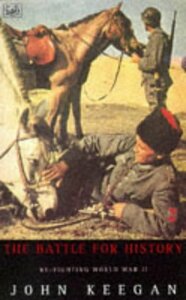Take a photo of a barcode or cover
Published in 90s, so more information has come out since. However, I found this book to be a good summing up and gave me ideas on other books to read
Not quite what I was expecting.
I still have a problem with his praise for David Irving.
Just ok in my opinion.
I still have a problem with his praise for David Irving.
Just ok in my opinion.
The Battle for History: Re-fighting World War II, essentially an extended literature review on the subject by British military historian John Keegan. Give that well over half a century has passed since the end of World War II; it strikes many as surprising that historians are still struggling to define it. I’m not sure why people are all that surprised, given the infinite angles and interpretations that can be applied to the events of the period (especially when one considers the ways in which the world was irrevocably altered).
In assessing the general histories, Keegan manages to illustrate the extent to which our past – including how we think about it, interpret it and define it – dictates our present. Each chapter covers separate approaches to the topic, including overall histories of the war, biographies, distinct campaigns, the intelligence war, logistics, and resistance. The book opens with an overview and discussion of how some of the war's main controversies have influenced the histories (i.e. strategic bombing; the use of nuclear weapons on Japan; the Allies’ failure to act on knowledge of German death camps; the withholding of intelligence for broader strategic aims; and the realpolitik that occurs during wartime).
This isn’t the perfect text. It limits itself to English-language books, and (not unrelated) favours the European war at the expense of the Asian and African theatres. However, one can’t expect extensive analysis in a work of such brevity. Keegan has done an admirable job in summing up key issues and describing the merits of a wide range of standard works on the war. If you are in any way interested in the area, this is a great resource, even if you might disagree on some of the individual points.
In assessing the general histories, Keegan manages to illustrate the extent to which our past – including how we think about it, interpret it and define it – dictates our present. Each chapter covers separate approaches to the topic, including overall histories of the war, biographies, distinct campaigns, the intelligence war, logistics, and resistance. The book opens with an overview and discussion of how some of the war's main controversies have influenced the histories (i.e. strategic bombing; the use of nuclear weapons on Japan; the Allies’ failure to act on knowledge of German death camps; the withholding of intelligence for broader strategic aims; and the realpolitik that occurs during wartime).
This isn’t the perfect text. It limits itself to English-language books, and (not unrelated) favours the European war at the expense of the Asian and African theatres. However, one can’t expect extensive analysis in a work of such brevity. Keegan has done an admirable job in summing up key issues and describing the merits of a wide range of standard works on the war. If you are in any way interested in the area, this is a great resource, even if you might disagree on some of the individual points.
A curious book about the history of books about WWII, not the war itself.
Excellent historiography by an eminent historian, but a little dated, considering how much literature has been produced since its publication.
informative
Keegan offers a good overview into historical opinion regarding the second world war
Little more then an extended biographical essay which documents books which Keegan "has found an indispensable guide to the war's drama and tragedy." It is none the less an interesting collection. I'm sure everyone who reads it will find room for disagreement with the books listed. I disagree with Keegan's inclusion of Ambrose's Eisenhower biography, however that's based in recent revelations regarding Ambrose's plagiarism and the possibility that he did not conduct all the interviews with Ike that he claimed to have, things Keegan would not have known when this book was published in 1995. Two other more bizarre inclusions are David Irving's Hitler's War and Goring. Keegan describes Irving as as championing extreme right-wing politics and having offered a reward to anyone producing written evidence of Hitler authorizing the final solution, he also describes him as a historian of formidable powers. Perhaps in 1995 Irving's travels to the lunacy of holocaust denial was not yet complete and Keegan's description of him was accurate at the time and perhaps, at one time Irving was a good historian but I think his recent activities have discredited his previous work. [return][return]A short book and worth reading, however it assumes the reader has some familiarity with the Second World War.[return][return]This book contains what may be the single most depressing thing I've read recently: [return][return]"By now, fifty years after 1945, I have read very extensively indeed. There are few aspects of the war about which I do not know something, and several about which I know a great deal. Nevertheless, it is the limitation rather than the scope of my knowledge of which I am most aware."[return][return]What hope is there for the rest of us?



